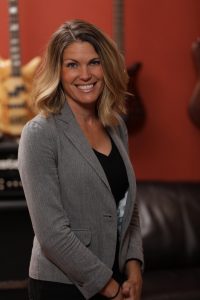The WiMN’s Front and Center is a weekly column that showcases accomplished women who work in the music and audio industries. We spotlight successful female performers, manufacturers, retailers, educators, managers, publicists, and everyone else in between. Want to be featured? Learn how here.
Front and Center: Sr. Manager Education Division, Korg USA Tiffany Stalker
By Laura Whitmore

Many of us have heard studies that demonstrate how kids who learn music do better in other areas of life, including academics, behavior, responsibility, and confidence. Couple that with today’s exciting music technology offerings, and you have a winning formula for motivating new students to learn about music. However, all too often, budget cuts force schools to downsize or eliminate their school music programs. And that’s where a select group of music industry companies, non-profits, and leaders such as Tiffany Stalker come into play, to address this important topic.
Stalker is the senior manager of the Education Division of Korg USA, where she has the opportunity to help schools learn about and incorporate technology into their programs, while also developing programs and creating awareness for ways in which schools can obtain funding to keep their music programs strong. The goal is to impact the lives of children in a positive way through music, while enabling our music industry to grow in future generations, which is something she’s very passionate about.
As a strong music education advocate, Stalker is also very active in publicly promoting strong music programs and touting the benefits of incorporating technology. She can be seen attending the NAMM organization’s Music Education Advocacy Fly-in sessions in Washington D.C., sitting on the board of TI:ME (Technology Institute for Music Educators), and out in the field at music education conferences and speaking engagements.
For more info, visit education.korg.com.
The WiMN: Please share some of your background. How did you initially become involved with promoting music education?
TS: As a child, I played multiple instruments both in the classroom and through private lessons, so I know what a positive impact music can have on a child. When the opportunity arose at Korg to help create opportunities for more music in the classroom, I was excited to be a part of it. I’ve always been passionate about building brands, and by nature am very competitive, so those two qualities motivate me to think outside the box and collaborate with Korg and others to create more music makers.
The WiMN: Were you a music lover or surrounded by music growing up?
TS: Yes! Beyond playing instruments, there was lots of music in our house. One of my fondest childhood memories is what we now refer to as “Saturday Morning Records” – back when people played actual records and it wasn’t just a novelty. My dad had an amazing collection of some of the greats – Earth, Wind and Fire, Chicago, Al Jarrreau, Michael Jackson, Hall and Oates, Styx and many more. Each Saturday we’d wake up to something new and fun to listen to.
The WiMN: You’re responsible for many aspects of your division. Tell us about some of your responsibilities.
TS: I’m fortunate to work for a great leadership team. We collaborate on ideas to grow our outreach in schools, assist our dealers to have an impact locally, and create programs to help music educators provide a great student learning environment. I’ve had the opportunity to lead our development team in creating a new successful hardware/software lab system, I get to work with our brand managers to create innovative approaches to selling products in the school market, and develop programs like our Keys for Kids Fundraising Program to help schools raise money specifically for music programs through direct donations.
I also manage SoundTree and the great team that works so diligently to increase music technology in schools via labs, studios, and other installation projects. I love that the scope of the job is wide! It allows me to creatively address our schools’ specific needs to help them overcome challenges and ultimately put more music in the classroom.
The WiMN: How did you develop your audio technology skill set, and how has that benefited the schools you serve?
TS: I had a small amount of tech background before starting at Korg, and honestly, I found audio technology intimidating at first. Over the years, through mentors and experts, I’ve gleaned enough knowledge to confidently tell educators, ‘If I can do it, you can too!’ The best thing about today’s technology is that it’s easier than ever to use, implement and teach. Many music educators aren’t quite sure how to integrate tech, but it’s a necessity for the longevity and growth of sustainable programs. Kids thrive on technology and it’s hard for them to imagine doing anything without it. We’ve heard countless success stories from failing programs that experienced revival by integrating something as simple as an iPad. Add some electronic instruments, speakers, a DAW and a microphone, and magic happens! There are many great funding opportunities available for technology that our music educators need to take advantage of to invigorate their programs.
TheWiMN: While the general education field has traditionally been female-dominated, the general music industry tends to be male-dominated. Have you faced any challenges as a female in music education marketing, or is the playing field more level in your scenario?
TS: First and foremost, I’m a mom to four beautiful, talented children who inspire me to make a difference every day. When I go to work – whether it’s at the office, a school, or a conference – I don’t really see the male vs. female challenges typically seen in other industries or markets. I see amazing people who are passionate about teaching music and making sure the arts are strong for future generations. In this field there’s also a different effect, because my kids give me credibility. They’re my sounding boards for new ideas, they’re my beta testers for lesson plans or new program ideas, and they give me the confidence to say we’ve tried it and it works.
The WiMN: What advice would you give young women starting out and trying to acclimate to a position somewhere in our music industry?
TS: Patience. This industry is unique in that we’re surrounded by musicians who are extremely passionate about what they do and have been doing it for a long time. Take your time and appreciate their wisdom, learn from anyone you can, and prepare to be the newbie for at least five years. I’m also a huge advocate of networking and facilitating introductions. When you’re somewhere new, don’t be afraid to ask a co-worker to connect the dots. Once you get a feel for where you are, it can end up being a small world, and it’s fun to get to know people. Stick your hand out and introduce yourself.
The WiMN: Why is outside support for music education more important than ever? Is there anything our readers can do to help support this cause?
TS: In today’s political environment, it’s more important than ever to make sure your local and state government knows you care about adequate funding for school music programs. As federal education budgets get cut, we’re seeing programs wither away and entire schools do away with music. That is unacceptable if we expect our industry to grow and thrive, and it’s up to us as industry professionals to do what we can to help these programs stay strong. Elementary music, middle school orchestra, high school marching band – they all feed into remarkable programs that transform students into effective leaders.
If I could inspire readers to make a difference, I’d encourage them to find a local organization that could use help. Carve out a few hours a month and get involved. I’d also challenge readers to learn what their state is doing to implement the new ESSA Federal Education Law. This has a localized impact, so letting your local representatives know you care about music as part of a well-rounded education might benefit your neighborhood schools right away. NAMM’s Support Music Coalition also has some amazing outreach tools.








